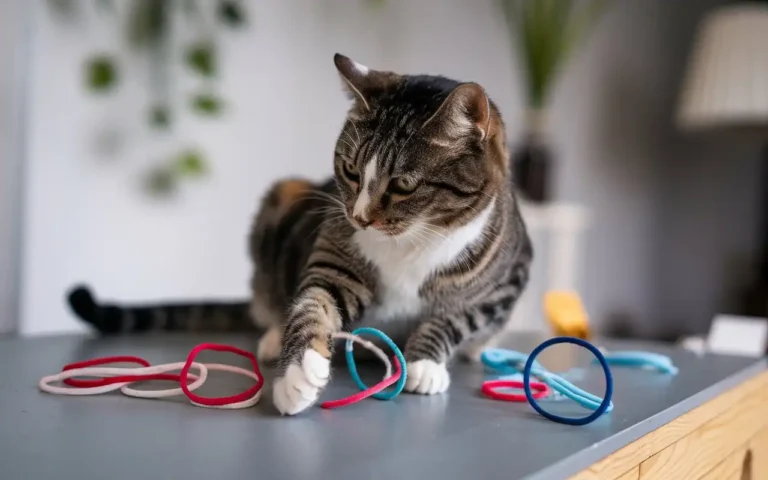Do Lost Cats Come Back? When to Stop Looking for a Lost Cat?
As a cat owner, one of the most painful moments is when the cat you love so much is nowhere to be seen, even after every nook and corner you have searched.
You have now reached a point where you are wondering if you should give up. Well, should you? And this is what this article is going to tell you.
When to stop looking for a lost cat? Keep reading to find out.
How to Get a Lost Cat to Come Home?

Crying won’t do. You need to get up, get active, and do it right if you want your cat home soon. It’s okay to shed a few tears here since this is probably the first time your cat has been lost.
And after that, here are some of the things that you need to do.
- Search your home and the surrounding area: See, when a cat gets lost, she won’t be more than a three to four-house radius away, at least most of the time. Check for open gates and ask neighbors to assist in the search.
- Ask neighbors to check their properties: Spread the word, knock on doors, and do all that it takes. Some may not cooperate, and you may feel awkward at first, but you’ll get over it now that your cat is at stake.
- Put up posters: The challenge here is that all cats look the same, at least almost the same. This calls for some work for you on your part. Make sure that you create detailed posters with colored pictures and offer a reward for the return of the cat.
- Set up a humane trap: A humane trap will not hurt your cat. It will merely cage them in, which is good because the cat will start whining, after which you can make your way.
- Use social media: Status, stories, and Facebook posts; here’s where they are all going to come in useful. Send a red alert to all animal lovers like you out there, who know how you feel and will help you in every way.
- Contact local animal shelters and vets: Another way out that probably wouldn’t come to your mind is a local animal shelter. Alert local animal shelters or vets to search for the cat and provide as much detail as possible.
- Set up a food and litter station: Cats are scared beings, and the first thing they do when they feel lost is hide. Therefore, setting up humane traps with treats and other things that will bring them out is the best way.
Do Lost Cats Come Back?

Yes, they may take days, weeks, and even disappear for months on end sometimes, but if your cat wants to, she will find a way to come back to you.
According to a study published in 2018 in the academic journal Animals, nearly 15% of cat owners lose their cats within five years of period.
Based on the study, here’s what they found:
- Around one-third of the lost cats were successfully located within a span of 7 days.
- Engaging in a physical search greatly enhances the likelihood of locating cats in a state of vitality.
- Surprisingly, around 75% of these cats were discovered within a 500-meter radius from where they initially went missing.
- Cats with outdoor access tend to travel greater distances compared to those confined indoors.
- Also, cats exhibiting highly curious personalities were found to have a higher probability of being located inside someone else’s residence.
So even if your cat hasn’t returned yet, that doesn’t mean she doesn’t love you. She perhaps wanted a little more freedom and adventure, like the prodigal son who may someday return to you.
When to Stop Looking for a Lost Cat?
When to stop looking for a lost cat depends on the cat and the situation. But, first of all, don’t give up too soon; that is not something anyone should tell you.
If the cat is an indoor/outdoor cat that normally doesn’t wander far from home, then you can probably stop looking after a week or so. However, if the cat is an outdoor cat that roams around the neighborhood, then you’ll need to keep looking for at least a month.
You can stop looking actively within several weeks, but never stop hoping that he or she might return because lost domestic cats sometimes return one way or another of their own accord months or even years later.
What this means to say is that you must not get disappointed. For all you know, she may have disappeared for a while and will return soon.
Read on to know the how and why.
Must Read: American Shorthair vs European Shorthair
What Are the Chances of a Lost Cat Coming Back?

Well, reports say that 30 percent of cats do try to find their way back, and while this may seem like a significantly smaller percentage, why don’t you keep your hopes high and believe that yours belongs to this 30 percent of cats?
Let’s look into how likely it is that a lost cat will be found within a certain time frame.
Chances of Finding Lost Cat After 24 Hours
According to research, 75% of lost cats are likely to be just 500 meters within your vicinity. You see, the little one would have just gone out in search of some food or a mate, in the process of which she has gone astray. And dumb as they may seem, cats are smart enough and will use their hunting skills to hunt their way back. You, on your part, calm down and relax.
Odds of Finding a Lost Cat After a Week
So, you have been searching for a week, have you? It is sure that you love your cat, so believe that he loves you too and will come back.
As mentioned earlier, the same research found that 34 percent of cats make it alive if they have been missing for a matter of seven days. Now, do the same thing as you were told to do above.
After all this, you still don’t want to believe that your cat may never come back, so the rest of this article is for you. Read on to see some of the things that you can do.
Where Do Cats Go When They Get Lost?

As you already saw in this article, most of them go hiding. Lost cats are scared cats. They don’t run but hide. That said, the following are some places they are likely to hide.
- Under Cars: Cats like the warmth of being under a car, so make sure that you look under every parked car.
- Other Houses: This is why we said to ask the neighbors. Stray cats are used to getting love from humans, and since they can’t find you, they will look for other humans, which could be your neighbors.
- Trees: Cats have a talent for climbing trees. It gives them a better view of things around them and helps them hunt. But sadly, this is where some of them get stuck and may not know how to return.
So, these are some of the places you need to keep an eye out for when you go in search of your cat. And yes, once you find her, don’t ever let her get lost again.
How Can Cats Find Their Way Back Home if They’re Lost?
Cats have a remarkable ability to find their way back home when lost. They use their keen sense of smell and memory to navigate their way back.
Some studies (the Lost Cat Research Project) state that some cats even travel for about 80 miles to make their way to their owner and find their way back.
Cats have an acute sense of smell, and they can remember the scent of their home and the surrounding areas. When they get lost, they use their sense of smell to retrace their steps back home.
Also, cats are known to have an excellent memory. They can remember landmarks, familiar paths, and the layout of their home. This memory helps them navigate their way back home when lost.
So, you see, your cat is as eager to find you as you are eager to have her back.
Recommended Reading: Are Stray Cats Friendly?
How Long Can Cats Live Lost?

Oh, you’re still on it. Stop worrying, will you? Cats are natural hunters and will eventually survive in the world out there, even if lost.
Cats are known to survive for months and even years. But that depends on several things, such as its health, diet, and environment.
So, instead of crying on the couch, why don’t you just cherish the many memories that your cat is given you?
How Do You Cope With a Missing Cat?
Yes, it can be hard, and you will need time to overcome it. There will be times when you have to look at the litter box and the water bowl, the chewed shoe, and the sofa with scratches and shed a tear, maybe cry bitterly.
But here’s a way out. Why not turn this sorrow into something productive, like write all that you feel, maybe even create a blog that cat lovers like you can go through?
Make sure that there is space for comments, for you will need all the love and support that will come to you. But most important of all, never use the phrase ‘if only.’ Not ever; blaming yourself won’t do.
What to Do When Your Lost Cat Returns Home?

Okay, now this calls for a celebration. The prodigal son is back home, but before you begin with the party and the feasting, let’s first behave like the responsible cat owner.
What does this mean? Read on to see.
1. Check Your Cat’s Health: You never know where your cat has been all the while she has been astray, what she has eaten, and what is going on with her health. So, one of the first things for you to do here is take her to the vet and see.
2. Offer Food, Water, and Rest: Long hours, days, and months of finding you have left her exhausted and overwhelmed. So, while you are excited at having her back, know that the party can’t begin just yet as the cat needs some time to rest.
3. Reintroduce Your Cat to its Surroundings: You will know that your cat is back in health when she starts purring and whining. But take it slow, for she is going to be a little shy around a few people and things.
4. Update Your Cat’s ID Tags and Microchip: T tag, and the chip has probably been chewed off and ripped. So get one done at the earliest. Make sure that it has all the details, loud and clear, so that anyone who finds her next time will come running to you.
5. Show Love and Affection: She is going to need it more now that she has spent days, weeks, or probably even months missing you. A little extra time for play won’t hurt amidst your busy schedule.
What Are the Best Ways to Prevent Losing a Cat?

Hmm, now that you got your cat back, you are only going to be more protective over her, aren’t you? That’s not a bad thing at all, so here are some tips to help you.
- Keep your cat indoors: She has had enough adventure. It’s time to make your home more cat-friendly, with toys and treats, love and affection to keep her with you. Do this, and your cat will never again want to leave you.
- Get your cat microchipped: This is a kind of permanent implant to identify a cat when he strays away again. Also known as radio frequency identification tags, these use radio frequency to help you identify your cat and bring him back.
- Use a collar and ID tag: A cat without a collar? This is not for you. So, off you go shopping, looking for a handsome collar and an ID tag that the neighbors can see the next time and bring the cat back to you.
- Train your cat to come when called: Training is very important for these little creatures that often have a mind of their own and do just what they want to do. A loving child, once in a way, won’t hurt.
- Create a safe outdoor space: Keeping the indoors of your house cat-friendly is not enough. You need to have a safe outdoor space, too, one which does not come with too many holes and ditches for her to fall into.
- Monitor your cat’s behavior: Discipline is good for a child, but a cat can get much more mischievous. If you have to punish her, do so, and she will learn where she must go and where she shouldn’t.
Frequently Asked Questions
So, you jumped here without reading any of the above or even having a look. Well then, this part is for you, the kind of reader who likes only the FAQs.
Q1. What Are The Odds Of Finding A Lost Cat After A Month?
Ans: The odds of finding a lost cat after a month is still high 61% of cats return even after a year, so if a month is gone, you still have hope.
Q2. Do Cats Get Lost?
Ans: Of course, yes, cats can get lost. Some reasons for getting lost include escaping through an open door or window, getting lost while exploring, or being frightened by loud noises.
Q3. How Long Should My Cat Be Missing Before I Worry?
Ans: A day. If your cat’s been missing for more than 24 hours, it’s time to take action. Your cat will be fine. Just hope for the best and that she is going to be back with you in time.
Q4. How Long Will A Cat Hide If Scared Outside?
Ans: If a cat is scared outside, the amount of time they hide can vary based on several factors, such as the cat’s personality, level of fear or anxiety, and environmental factors. According to some cat owners, their cats hide for a few hours to a few days when frightened outside.
Q5. Is It Better To Look For Lost Cats At Night?
Ans: It is not necessarily better to look for lost cats at night. In fact, it may be more difficult to find them in the dark. Also, searching for lost cats at night may not be safe for the person looking for the cat.
Closing Thoughts
What are the chances of a lost cat coming back? In other words, when to stop looking for a lost cat?
Who knows, your cat is going to come back someday. Or, for all you know, she has found somewhere better to stay.
Friend, relax, and don’t worry too much about it. After all, cats are independent and free-spirited creatures. You’ll know if she’s happy wherever she is.






![Why Are Orange Cats So Dumb? [Facts & Truths!] 13 There is an orange tabby cat looking at you. why are orange cats so dumb?](https://www.petbouncy.com/wp-content/uploads/2022/12/pexels-ozge-karabal-7499734-1.jpg)